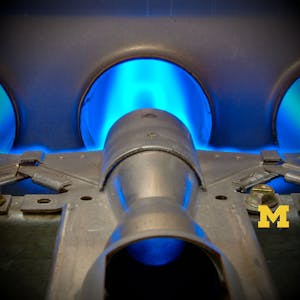Introduction to Thermodynamics Transferring Energy from Here to There
COURSE DESCRIPTIONThis course provides an introduction to the most powerful engineering principles you will ever learn - Thermodynamics: the science of transferring energy from one place or form to another place or form. We will introduce the tools you need to analyze energy systems from solar panels, to engines, to insulated coffee mugs. More specifically, we will cover the topics of mass and energy conservation principles; first law analysis of control mass and control volume systems; properties and behavior of pure substances; and applications to thermodynamic systems operating at steady state conditions.
COURSE FORMAT
The class consists of lecture videos, which average 8 to 12 minutes in length. The videos include integrated In-Video Quiz questions. There are also quizzes at the end of each section, which include problems to practice your analytical skills that are not part of video lectures. There are no exams.
GRADING POLICY
Each question is worth 1 point. A correct answer is worth +1 point. An incorrect answer is worth 0 points. There is no partial credit. You can attempt each quiz up to three times every 8 hours, with an unlimited number of total attempts. The number of questions that need to be answered correctly to pass are displayed at the beginning of each quiz. Following the Mastery Learning model, students must pass all 8 practice quizzes with a score of 80% or higher in order to complete the course.
ESTIMATED WORKLOAD
If you follow the suggested deadlines, lectures and quizzes will each take approximately ~3 hours per week each, for a total of ~6 hours per week.
TARGET AUDIENCE
Basic undergraduate engineering or science student.
FREQUENTLY ASKED QUESTIONS
- What are the prerequisites for taking this course?
An introductory background (high school or first year college level) in chemistry, physics, and calculus will help you be successful in this class.
-What will this class prepare me for in the academic world?
Thermodynamics is a prerequisite for many follow-on courses, like heat transfer, internal combustion engines, propulsion, and gas dynamics, to name a few.
-What will this class prepare me for in the real world?
Energy is one of the top challenges we face as a global society. Energy demands are deeply tied to the other major challenges of clean water, health, food resources, and poverty. Understanding how energy systems work is key to understanding how to meet all these needs around the world. Because energy demands are only increasing, this course also provides the foundation for many rewarding professional careers.
None
Syllabus
Syllabus - What you will learn from this course
Week 1
Week 1
Week 2
Week 2
Week 3
Week 3
Week 4
Week 4
Week 5
Week 5
Week 6
Week 6
Week 7
Week 7
Week 8
Week 8
FAQ
When will I have access to the lectures and assignments?
Access to lectures and assignments depends on your type of enrollment. If you take a course in audit mode, you will be able to see most course materials for free. To access graded assignments and to earn a Certificate, you will need to purchase the Certificate experience, during or after your audit. If you don't see the audit option:
What will I get if I purchase the Certificate?
When you purchase a Certificate you get access to all course materials, including graded assignments. Upon completing the course, your electronic Certificate will be added to your Accomplishments page - from there, you can print your Certificate or add it to your LinkedIn profile. If you only want to read and view the course content, you can audit the course for free.
What is the refund policy?
You will be eligible for a full refund until two weeks after your payment date, or (for courses that have just launched) until two weeks after the first session of the course begins, whichever is later. You cannot receive a refund once you’ve earned a Course Certificate, even if you complete the course within the two-week refund period. See our full refund policy.
Is financial aid available?
Yes. In select learning programs, you can apply for financial aid or a scholarship if you can’t afford the enrollment fee. If fin aid or scholarship is available for your learning program selection, you’ll find a link to apply on the description page.
Reviews
Great practical information to thermodynamical processes and machines with many calculated examples. A bit light on the fundamental definitions, like entropy, but very good for hands-on work.
Fantastic course. Want to revise and refine your basic thermodynamics concepts specially related to Mechanical engineering? Then go for it, This course is for you.
Great course. But I was also hoping to get an in-depth analytical understanding of the second law of thermodynamics and the zeroth law as well. But I really enjoyed it and definitely learned a lot.
One of the Best Teachers ever I studied under!! I sincerely wish that we can get more courses by the same teacher on Coursera. I would be more than happy to pursue those courses.
